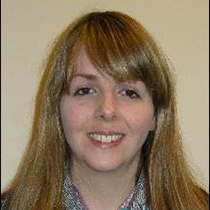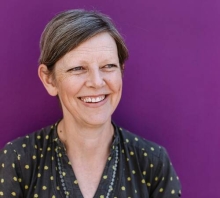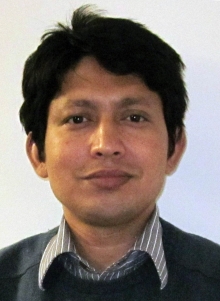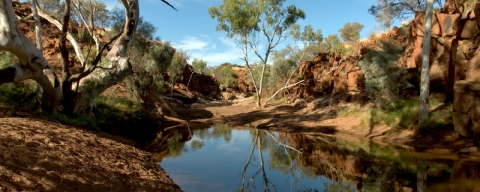
Key information
UCAS code:
F910
Typical offer:
112-120 UCAS points to include a minimum of 2 A levels, or equivalent, with 40 UCAS points from a specific Science subject
Showing content for section Overview
Overview
Environmental issues – such as habitat loss, water pollution and climate change – pose a serious threat to the long-term existence of life on Earth.
If you want to help lead the charge against climate change, learn a skill set that's in demand globally, and secure a rewarding career, this BSc (Hons) Environmental Science and Management dual degree is the perfect next step.
You'll study in Portsmouth and spend a year at Edith Cowan University in Perth, Western Australia, getting a global perspective in how the environment is changing and the steps we need to take to reverse this change.
Course highlights
- Use industry-standard lab tech in our environmental analytical laboratories, including GIS software and plasma spectrometry
- Explore the natural environment of the Australian outback through field work and visit Aboriginal tribes to understand how they manage their land
- Take field trips from Portsmouth to apply what you learn in many different cultures, habitats and climates – from Somerset to Malta
- Learn scientific and technical diving certified by the Professional Association of Diving Instructors (PADI)
- Work alongside active research staff in the UK and Australia, and study alongside BA and BSc Geography students, gaining valuable experience and perspective from another scientific discipline
Earth systems and environmental sciences at the University of Portsmouth is ranked 4th of all post-1992 universities for research quality (Research Excellence Framework (REF) 2021)
Read more about our amazing earth systems and environmental sciences research
Why do a dual degree?
This course is a dual degree (also known as a double degree).
When you complete the course successfully, you'll have 2 degrees – one from the University of Portsmouth and one from Edith Cowan University.
Dual degrees allow you to achieve 2 degrees in 3.5 or 4 years rather than 6 years.
You'll benefit from a global education experience and the high-calibre teaching expertise, latest research and modern facilities at two universities. You'll also develop a more comprehensive knowledge of communication and media than on a single degree and gain an understanding of different cultures, which will help you work more effectively with people from different backgrounds.
All of this will help you stand out in a competitive job market after you graduate.
You'll be based in Portsmouth in years one and two, and for six months or a year at the end of the course. You'll spend year three in Perth, Western Australia at Edith Cowan University.
You'll get support with travel arrangements, visas, finding accommodation and accessing loans and other funding that can help pay for your study and living costs when you're in Australia.
Edith Cowan University is one of the top 100 young universities in the world one of the top 100 universities in the Asia-Pacific regions (Times Higher Education 2019 and 2020). The Good Universities Guide 2021 gives the University 5 out of 5 stars for its learner resources, student support, teaching quality and overall experience.
Like Portsmouth, Perth offers a mix of city and outdoor living. It's a great base for exploring Western Australia and beyond.
What is a dual degree?
Learn about our dual degree programmes with Edith Cowan University in Australia.
Chris Chang: We have a strategic partnership with Edith Cowan University in Australia, particularly for students who have not travelled abroad or lived abroad, that gives them the opportunity to experience a dual degree. The design of our programmes means that we have developed the programme from the ground up, which doesn't require you to study that much more time for a degree programme.
Heather Massey: There's lots of reasons why people might want to come and study this dual award course at the University of Portsmouth. Learning in a different environment from different tutors and the facilities that they have at Edith Cowan are absolutely first-class.
Chris Chang: Students have the opportunity to travel for a year and the question that some students will have is "how will I be able to afford this?" Now the UK Government has launched the Turing programme and what this programme does is fund them to do study abroad, internships, placements. It makes it accessible to all students from different groups, whether they are international students or students from the UK.
Dr Sarah Reynolds: Experiencing life in a different country. You would mature and develop your confidence during that time and definitely walk out of the degree, I think standing up a bit taller than if you hadn't.
Chris Chang: Now the benefits of this is that you can actually show to employers that you have two degrees from two different universities in two different countries. Jobs these days have changed quite substantially. Your future job may not be in the UK and employers are looking for the kind of employees that are able to work in different contexts, different cultures be able to work in multidisciplinary and multinational teams.
One of the other benefits of this programme is that you can actually travel around, not just, Australia but around the ASEAN region because from Perth it's a very short flight to Hong Kong; to Singapore; to Malaysia.
Heather Massey: It's an amazing opportunity to learn both from experts in their field, but also learn about how different people in a different culture operate.
Chris Chang: There are inter-semester breaks of two-three months and you should use that opportunity to see the world. The other thing that you have is having studied a year abroad, you will make friends who could in the future be your supporters, be your allies, and be your collaborators of the future.
Dr Leah Fox: Even though they're geographically away. They'll still be able to get access to that same level of support as they were getting in Portsmouth. They'll have access to wellbeing, they'll have access to financial services, they'll have access to personal tutoring.
Chris Chang: These courses that we have delivered so far: Global Sport Management, Cybersecurity, Intelligence and Counter Terrorism, Environmental Science and Management are all in very specialist and niche areas. Means that wherever you end up working or living, you're prepared for it. The demand for these courses are high, so we want highly motivated students who will benefit from this programme and benefit from a year abroad.
Dr Leah Fox: We're looking for an applicant who wants to make a change, who is open minded and prepared to be confronted with a number of challenges. But overall, someone who is curious and wants to learn.
Contact information
Contact AdmissionsEntry requirements
Entry requirements
Typical offers
- A levels - BBB-BBC
- UCAS points - 112-120 points to include a minimum of 2 A levels, or equivalent, with 40 points from a Science subject (Biology, Chemistry, Environmental Science/Studies, Geography, Geology, Mathematics or Physics). (calculate your UCAS points)
- T-levels - Merit. Acceptable T Level Subjects:
T Level in Health, T Level in Healthcare Science, T Level in Science - BTECs (Extended Diplomas) - DDM-DMM
- International Baccalaureate - 25
You may need to have studied specific subjects – find full entry requirements and other qualifications we accept.
English language requirements
- English language proficiency at a minimum of IELTS band 6.0 with no component score below 5.5.
See alternative English language qualifications.
We also accept other standard English tests and qualifications, as long as they meet the minimum requirements of your course.
If you don't meet the English language requirements yet, you can achieve the level you need by successfully completing a pre-sessional English programme before you start your course.
We look at more than just your grades
While we consider your grades when making an offer, we also carefully look at your circumstances and other factors to assess your potential. These include whether you live and work in the region and your personal and family circumstances which we assess using established data.
Facilities and specialist equipment
GIS and Remote Sensing Laboratory
Discover more about the planet's physical structures and scientific processes, such as glaciers and coastal flooding, using drone data, aerial and satellite remote sensing and geographic information systems.

Mass Spectrometry and Laser Ablation Laboratory
Investigate the geological and planetary processes that influence environment change and natural resource formation in this lab, using our industry standard spectrometers and laser ablation system.
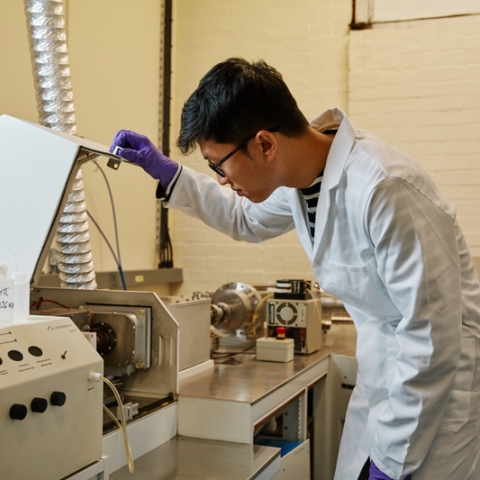
Environmental Chemistry Analysis Laboratory
Use the equipment in this lab to identify and analyse chemicals and biochemicals in surface water, groundwater and soil, so you can develop strategies to minimise and remove their harmful environmental effects.
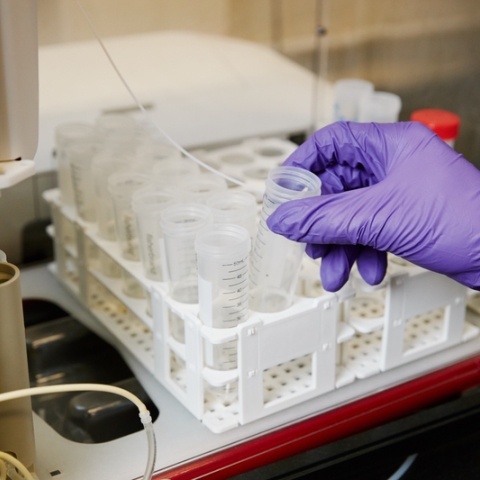
Geochemistry Laboratory
Study the ancient properties of the Earth’s surface materials in this lab, using techniques including palynology processing – the study of strewn particles – for acid dissolutions of rock matrices, sample sieving and heavy liquid separation.

Careers and opportunities
The necessity of tackling environmental problems, and the importance of sustainability, are gradually being recognised by governments. This means that employment opportunities in the area of environmental science are on the rise – by 91% in the UK alone.
The global nature of the climate crisis we face means that international experience on a professional and cultural level is also sought after by employers in this sector. The experience you get on field trips abroad, and during your year at Edith Cowan University in Australia, will be invaluable to your employment prospects.
Gain a global perspective on environmental science
By completing modules on topics such as energy resources, environmental impact and assessment, pollution, and aboriginal perspectives on the environment, you'll get a detailed global overview of the problems facing our environment, and the means to start solving them.
When you graduate you'll have a suite of environmental science skills, and a wealth of practical experience in applying them, making you an ideal candidate for many roles in the environmental sector. Your experience of international study and other cultures will make you a particularly attractive employment prospect.
Completing this degree is also the ideal next step to further, postgraduate study. You could further refine your expertise in more specific, connected fields, for example, by doing an Environmental Geology and Land Contamination MSc or a research degree in Earth and Environmental Sciences.
What areas can you work in with an environmental science and management dual degree?
When you graduate, you could work in areas such as:
- conservation
- pollution monitoring and control
- waste management
- sustainability
- environmental audit and assessment
- climate change study and activism
- environmental energy
Potential roles
Roles you could take on include:
- environmental manager
- environmental chemist
- environmental consultant
- geographic information scientist
- conservation officer
- waste management manager
- environmental policy officer
- hydrologist
- climate change modeller
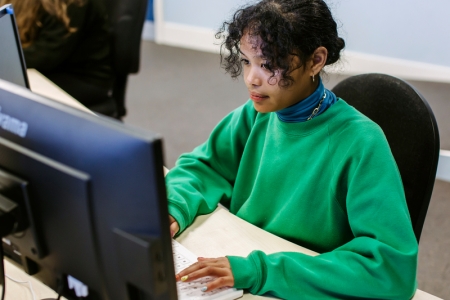
Ongoing career support – up to 5 years after you graduate
Get experience while you study, with support to find part-time jobs, volunteering opportunities, and work experience.
Towards the end of your degree and for up to five years after graduation, you’ll receive one-to-one support from our Graduate Recruitment Consultancy to help you find your perfect role.
Modules
Each module on this course is worth 15, 20 or 40 credits.
In years 1, 2 and 3 you need to study modules worth a total of 120 credits. For example, 4 modules worth 20 credits and 1 module worth 40 credits.
In your final year (which lasts 6 months), you'll complete your dissertation worth 40 credits.
What you'll study (indicative)
Core modules in this year include:
- Analysis of the Earth and Environment – 20 credits
- Ecology, Plants and Human Impact – 20 credits
- Environmental Processes and Hazards – 20 credits
- Global Environmental Challenges – 20 credits
- Introduction to Marine Ecology and Oceanography – 20 credits
- Planet Earth – 20 credits
There are no optional modules in this year.
Core modules in this year include:
- Environmental Chemistry and Monitoring – 20 credits
- GIS and Remote Sensing – 20 credits
- Research, Fieldwork and Professional Skills – 40 credits
Optional modules in this year include:
- Energy Resources and the Science of Zero Carbon – 20 credits
- Environmental Change – 20 credits
- Hydrology and Geoenvironmental Risk – 20 credits
- Introduction to Teaching – 20 credits
- Practical Boating Skills – 20 credits
- River Processes – 20 credits
- Scientific and Technical Diving Techniques A – 20 credits
- Scientific and Technical Diving Techniques B – 20 credits
- Transport and Sustainability – 20 credits
Core modules
- Aboriginal Perspectives on the Environment – 15 credits
- Australian Biota – 15 credits
- Environmental Impact Assessment – 15 credits
- Environmental Investigation and Monitoring – 15 credits
- Marine and Freshwater Processes – 15 credits
- Soil and Land Processes – 15 credits
- Sustainable Water – 15 credits
- Waste Management (Online) – 15 credits
There are no optional modules in this year.
Core modules in this year include:
- Dissertation – 40 credits
Optional modules in this year include:
- Environmental Auditing and Assessment – 20 credits
- Environmental Pollution and Waste Management – 20 credits
- Hazardscapes – 20 credits
Changes to course content
We use the best and most current research and professional practice alongside feedback from our students to make sure course content is relevant to your future career or further studies.
Therefore, course content is revised and regularly reviewed. This may result in changes being made in order to reflect developments in research, learning from practice and changes in policy at both national and local levels.
How you're assessed
You'll be assessed through:
- field work
- lab notebook recordings
- scientific reports
- site surveys
- computer-based exercises
- oral presentations (individual and group)
- essays (coursework and under exam conditions)
- posters
- exams
- computer labs
You'll be able to test your skills and knowledge informally before you do assessments that count towards your final mark.
You can get feedback on all practice and formal assessments so you can improve in the future.
Teaching
Teaching methods on this course include:
- lectures
- tutorials
- laboratory work
- field work
- workshops
- guest speakers
- online learning
You can access all teaching resources on Moodle, our virtual learning environment, from anywhere with a Web connection.
How you'll spend your time
One of the main differences between school or college and university is how much control you have over your learning.
As well as attending your timetabled classes you'll study independently in your free time, supported by staff and our virtual learning environment, Moodle.
A typical week
We recommend you spend at least 35 hours a week studying for your Environmental Science and Management degree. In your first year, you’ll be in timetabled teaching activities such as tutorials, lectures, practical classes and workshops and external visits for about 12-15 hours a week. The rest of the time you’ll do independent study such as research, reading, coursework and project work, alone or in a group with others from your course. You'll probably do more lab and fieldwork in years 2 and 3, but this depends on which modules you choose.
Most timetabled teaching takes place during the day, Monday to Friday. You may occasionally need to go to University and course events in the evenings and at weekends.
Term times
University of Portsmouth (years 1, 2 and 4)
The academic year at University of Portsmouth runs from September to early June with breaks at Christmas and Easter. It's divided into 2 teaching blocks and 2 assessment periods:
- September to December – teaching block 1
- January – assessment period 1
- January to May – teaching block 2 (includes Easter break)
- May to June – assessment period 2
You'll finish your final year in December.
Edith Cowan University (year 3)
The academic year at Edith Cowan University runs from February to November with breaks at Easter and in June. It's divided into 2 semesters and 2 exam periods:
- February to May – semester 1 (includes Easter break)
- June – exam period 1
- July to October – semester 2
- November – exam period 2
You'll start year 3 at ECU in semester 2 in July, finishing in semester 1 in May.
Where you'll study (year 3)
You'll study at Edith Cowan University's Joondalup Campus during your third year and student accommodation is available on the Mount Lawley Campus. Both campuses offer a library, computer labs, cafes, bars, a fitness centre, student support and counselling services.
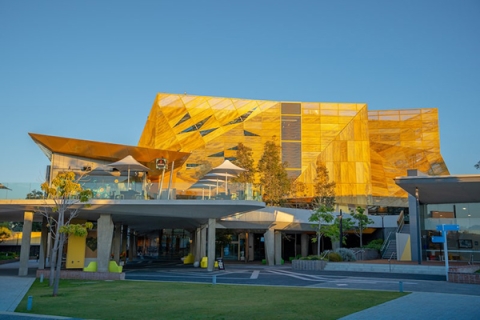


Supporting you
The amount of timetabled teaching you'll get on your degree might be less than what you're used to at school or college, but you'll also get support via video, phone and face-to-face from teaching and support staff to enhance your learning experience and help you succeed. You can build your personalised network of support from the following people and services:
You'll also have full access to all of these Portsmouth University support services while you're in Australia.
Types of support
You'll have a personal tutor from the University of Portsmouth and a country link tutor from Edith Cowan University when you're studying in Perth in year 3.
Your personal tutors help you make the transition to independent study and give you academic and personal support throughout your time at university.
You’ll have regular contact with them in learning activities or scheduled meetings. You can also make an appointment with them if you need extra support. They'll be available virtually in year 3 when you're in Australia.
You'll have help from a team of faculty learning support tutors. They can help you improve and develop your academic skills and support you in any area of your study.
They can help with:
- Improving your academic writing (for example, essays, reports, dissertations)
- Delivering presentations (including observing and filming presentations)
- Understanding and using assignment feedback
- Managing your time and workload
- Revision and exam techniques
As well as support from faculty staff and your personal tutor, you can use the University's Academic Skills Unit (ASK).
ASK provides one-to-one support in areas such as:
- academic writing
- note taking
- time management
- critical thinking
- presentation skills
- referencing
- working in groups
- revision, memory and exam techniques
Our online Learning Well mini-course will help you plan for managing the challenges of learning and student life, so you can fulfil your potential and have a great student experience.
You can get personal, emotional and mental health support from our Student Wellbeing Service, in person and online. This includes 1–2–1 support as well as courses and workshops that help you better manage stress, anxiety or depression.
If you require extra support because of a disability or additional learning need our specialist team can help you.
They'll help you to
- discuss and agree on reasonable adjustments
- liaise with other University services and facilities, such as the library
- access specialist study skills and strategies tutors, and assistive technology tutors, on a 1-to-1 basis or in groups
- liaise with external services
Library staff are available in person or by email, phone, or online chat to help you make the most of the University’s library resources. You can also request one-to-one appointments and get support from a librarian who specialises in your subject area.
The library is open 24 hours a day, every day, in term time.
If English isn't your first language, you can do one of our English language courses to improve your written and spoken English language skills before starting your degree. Once you're here, you can take part in our free In-Sessional English (ISE) programme to improve your English further.
Course costs and funding
Tuition fees
Fees may be subject to annual increase
UK/Channel Islands and Isle of Man students
- Years 1 and 2 – £9,250 a year
- Year 3 – £1,385
- Year 4 – £4,625
EU students
- Years 1 and 2 – £9,250 a year
- Year 3 – £1,385
- Year 4 – £4,625
Includes Transition Scholarship.
International students
- Year 1 and 2 – £19,200 a year
- Year 3 – £2,000
- Year 4 – £9,600
Funding your studies
Find out how to fund your studies, including the scholarships and bursaries you could get. You can also find more about tuition fees and living costs, including what your tuition fees cover.
Applying from outside the UK? Find out about funding options for international students.
Additional course costs
These course-related costs aren’t included in the tuition fees. So you’ll need to budget for them when you plan your spending.
Additional costs
Our accommodation section shows your accommodation options and highlights how much it costs to live in Portsmouth.
You’ll study up to 6 modules a year. You may have to read several recommended books or textbooks for each module.
You can borrow most of these from the Library. If you buy these, they may cost up to £60 each.
We recommend that you budget £75 a year for photocopying, memory sticks, DVDs and CDs, printing charges, binding and specialist printing.
If your final year includes a major project, there could be cost for transport or accommodation related to your research activities. The amount will depend on the project you choose.
You'll need to pay for meals and other living costs in the range of £50–£200 while completing compulsory fieldwork, depending on location and duration. Travel and accommodation costs for compulsory fieldwork are covered by your course fee.
You'll need to contribute towards the cost of optional fieldwork programmes, which usually cost £50–£2,000.
You'll need to cover your living costs and pay additional costs of £3,000–£4,000 to cover travel to and from Australia in year 3. You can cover these costs using a UK Government student loan.
We can advise you on travel arrangements, visas, finding accommodation and accessing a student loan that can help pay for your study and living costs when you're in Australia.
During your placement year or study abroad year, you’ll be eligible for a discounted rate on your tuition fees. Currently, tuition fees for that year are:
- UK/Channel Islands and Isle of Man students – £1,385 a year (may be subject to annual increase)
- EU students – £1,385 a year, including Transition Scholarship (may be subject to annual increase)
- International students – £2,875 a year (subject to annual increase)
The costs associated with your specific destination will be discussed during your second year, as well as possible sources of additional funding.
Apply
How to apply
To start this course in September 2024, please contact us.
Don't worry if you change your mind about studying abroad after you start the course. It's easy to transfer to a similar course once you're at Portsmouth or study this course as a single degree if you decide not to attend Edith Cowan University in year 3.
Come to an Open Day
You can also sign up to an Open Day to:
- Tour our campus, facilities and halls of residence
- Speak with lecturers and chat with our students
- Get information about where to live, how to fund your studies and which clubs and societies to join
If you're new to the application process, read our guide on applying for an undergraduate course.
Applying from outside the UK
As an international student you'll apply using the same process as UK students, but you’ll need to consider a few extra things.
You can get an agent to help with your application. Check your country page for details of agents in your region.
Find out what additional information you need in our international students section.
If you don't meet the English language requirements for this course yet, you can achieve the level you need by successfully completing a pre-sessional English programme before you start your course.
Admissions terms and conditions
When you accept an offer to study at the University of Portsmouth, you also agree to abide by our Student Contract (which includes the University's relevant policies, rules and regulations). You should read and consider these before you apply.

